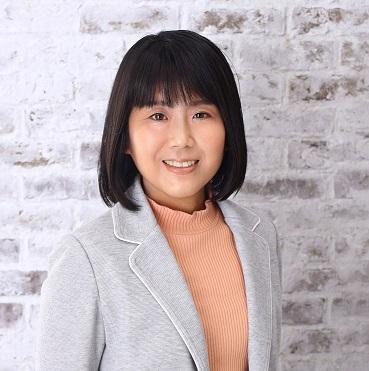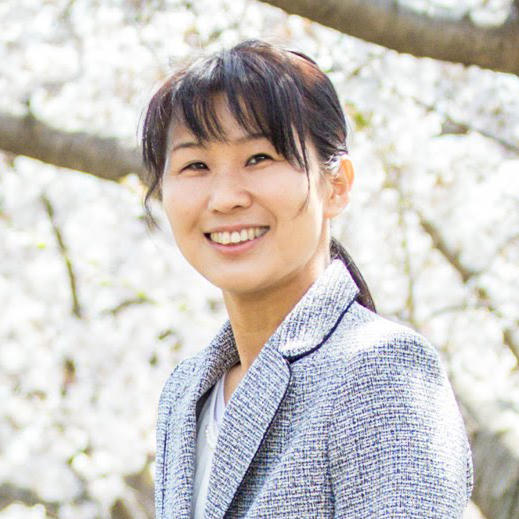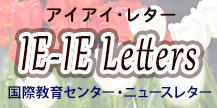IE-IEレター* Letter 1.派遣留学担当の佐々木先生に伺う
~派遣留学担当の佐々木先生に伺う~ Interview with Naoko Sasaki-sensei, in charge of Study Abroad Programs
佐々木 直子先生は国際教育センターで派遣留学関係を担当しています。どのような経緯で国際教育に関わることになったのか、またご自身の海外経験はどうであったかなどについて伺います。聞き手は、これまで国際教育センターでwebの管理・運営を担当してきた前田春菜さんです。
日本語のビデオクリップとその英語によるスクリプトをご覧ください。


話し手:佐々木 直子先生 聞き手:前田春菜さん
Interviewee:Naoko Sasaki-sensei , Interviewer: Haruna Maeta
Naoko Sasaki-sensei is in charge of study-abroad programs and related matters at the International Education Center(IEC). The opening question is how Sasaki-sensei became involved in international education and what international experiences she had. The interviewer is Ms. Haruna Maeda, who has been in charge of the IEC's web Management and Operations until now.
See the video clip in Japanese and its script in English.
(Transcript of the conversation using transcription software and machine translation)
M= Haruna Maeta (IEC web Management and Operations)
S= Naoko Sasaki (IEC faculty)
M: So, can you give us a brief profile of yourself, Sasaki-sensei?
S: I was born and raised in Fuchu City, Tokyo. I lived in the U.S. for a year when I was in junior high school because of my father's work.
After that, I grew up in Japan and have been working at UEC for more than 20 years since I graduated from college.
I originally worked in an administrative position, but have been working as a faculty member at the International Education Center since 2015.
M: What kind of work do you do now?
S: I am in charge of study-abroad programs. I am in charge of counseling on study-abroad and exchange programs for students who want to study at partner universities.
I am mainly in charge of short-term overseas training programs during summer and spring vacations, which are designed to improve language skills and cross-cultural understanding.
M: Thank you. Now, why did you decide to work for UEC? and how did it all start?
S: When I was a university student, I was really worried about what I would do after graduation.
However, I could not think of anything concrete to do.
If it was just about working, I had a vague idea that I would like to work in the civil service, where even women can work for a long time.
So, I studied for the civil service exam and took it and passed. However, I still did not have the confidence to enter the workforce. So, I decided to continue my studies and took the transfer exams for different fields at several universities, but I was not accepted. It was February and I was about to graduate from college.
So, at a loss, I decided to take the public service exam again after graduation and try to get hired. Then, in February or March, I was approached by several institutions, including UEC, asking if I would like to come in for an interview. The day before my graduation ceremony, I received a job offer from UEC. I was very grateful because my family lived in Fuchu and I was able to work in a very academic atmosphere, with lots of greenery and a vibrant campus full of students.
M Thank you. I understand that you initially worked in an administrative position at UEC, but you eventually switched from an administrative position to a teaching position.
S: Yes. I worked in international relations at UEC for quite a long time.
At that time, there was an open position for a teacher in charge of study-abroad programs at the International Education Center, and I thought I could work in a way that would allow me to further develop my expertise, so I consulted with several professors and others within the university. I was encouraged to try, so I gave it a shot.
By the way, I did a joint research project with a faculty member with whom I’d had the opportunity to work together for a number of years before that. It just so happened that I mentioned in a chat that I would like to do a particular research topic, and that faculty member taught me his research from the ground up, and I wrote papers and presented them at international conferences.
It seems they took that experience into consideration when they hired me.
M: You are now able to give students friendly and accurate advice.
S: Yes, and I think that experience with the research is still applicable today!
M: Do you find your current job as a teacher challenging at many times?
S: Well, I feel rewarded when students come back from their study-abroad programs and report to me that they are glad they went, or that they had a good time, or when they get a job at a milestone in their lives, or at a graduation ceremony, or when they contact me after graduation.
M: Studying abroad has many advantages. What do you see as the significance of studying abroad?
S: As a national policy in Japan, the Japanese economy has been stagnant for a long time and salaries have not increased for a long time. (This is different from overseas situations.)
As the birthrate declines and the population ages, study abroad is being promoted from the perspective of fostering human resources who possess the mindset and energy to change society.
I think that is very important, but on the other hand, I think it is fine for each individual student to make his or her own decision.
I think it will give students a chance to improve their English, broaden their horizons, and find out what they are suited for, etc.
It is said that we cannot predict at all how the world will change in the future, so this is a good opportunity to expand our life choices.
M: I sense Sasaki-sensei's very positive energy, your way of thinking, and your bright ambition. What is your motto?
S: Yes, that's right. The motto is a bit long, but it goes something like this: "If you try, you will succeed. If you don’t try, you won’t succeed. If you don't succeed, it's because you don’t try.” I understand that it means that it is important to try, and if you try, you may get things done. This maxim cheers me up.
M: Thank you. I understand that you spent a year in the U.S. when you were in junior high school. Did you enroll in a local school?
S: Yes. I entered a completely local school environment where Japanese was not spoken at all.
In addition to that year in the U.S., I also spent a year in 2008 as an intern at an American university for a year as part of a training program of the Ministry of Education, Culture, Sports, Science, and Technology. I received training in English by working in a kind of international office of an American university.
M: What are your hobbies?
S: Not much, but I like to travel quite a bit, and before the Corona pandemic I went to many places. However, the Corona pandemic has made it almost impossible for me to travel, and I am now looking forward to supporting a music band that I liked when I was younger. I do so because they have suddenly made a comeback.
M: Are there any cities that you thought were good to travel to?
S: Every city was impressive. I recently went abroad for the first time in over 3 years, after not being able to go abroad for about 3 years due to COVID-19. It gave me a new perspective. The place I went to was Da Nang, which is the third largest city in Vietnam. It is now attracting attention as a beach resort, and there are still some World Heritage sites nearby, such as an old town from the 16th century. We decided to send our first group of students there for language training during spring break, so we went there for a meeting and a preliminary inspection.
M: Do you have any movie recommendations?
S: There is a fairly famous Indian movie from about 10 years ago titled "3 Idiots” or “It Will All Work Out" in the Japanese version. It is a comedy about a genius and unconventional male student and his friends. It is a good movie that makes you think about what education is, what friendship is, and what is important in life. Also, there are a lot of vast Indian landscapes.
Since it is an Indian film, there are scenes where the performers suddenly start dancing, making it a film that can be enjoyed on many levels.
M: Could you give a message to the students attending UEC?
S: Like myself, I think there are many people who have difficulty finding or deciding what they want to do after graduating from a university. If you have a favorite thing, I think it is a good idea to keep on pursuing it. For those who are not so sure yet, I think it is a good idea to take advantage of the various opportunities in front of you.
Studying abroad is one such option. It may seem the hurdle is a bit high, but there are various types of programs available, so if you are at all interested, please give it a try.
M: From your own experiences, what do you think are some differences between Japanese and American junior high schools?
S: The gap in junior high school I found was the free atmosphere and no school uniforms.
Naturally, everyone's hair color was different, and girls had piercings. The classes are like a university, with many electives even for junior high school students.
In Japan, students stay in the same classroom all the time, and a different teacher comes to teach each subject. In the U.S., however, students move to different classrooms depending on the class, so the atmosphere was like a university. I still felt that there was some kind of respect for individuality.
M: Do you recommend any routines or study methods for improving English skills?
S: Let me see. I think it comes down to how much time you want to spend.
So, a method that is easy to continue would be better. If you are the type of person who likes to study for tests and set a goal of how many points you are going to get and work hard toward that goal, that kind of study method is fine.
If you like foreign dramas or movies, it would be a good idea to watch those repeatedly to get used to daily conversation, etc. In addition to online English conversation services, there are various inexpensive programs available these days, so I think you just have to find a way that you can keep up and keep doing it.
M: Thank you very much for your time today.
S: Thank you.
作成日:2023年2月19日 / 更新日:2023年3月31日






